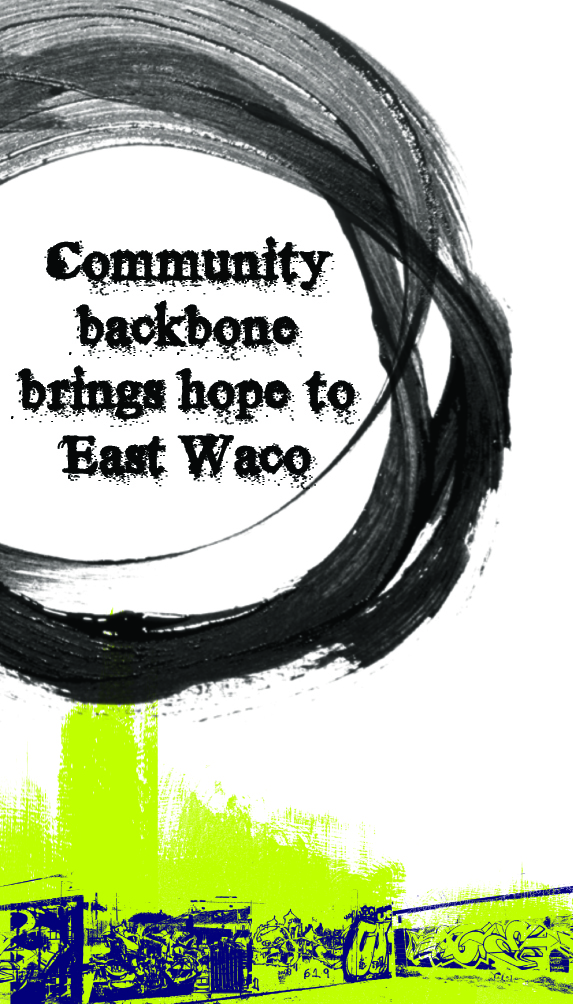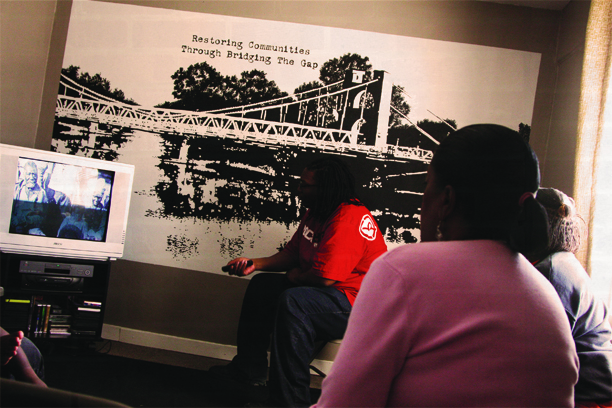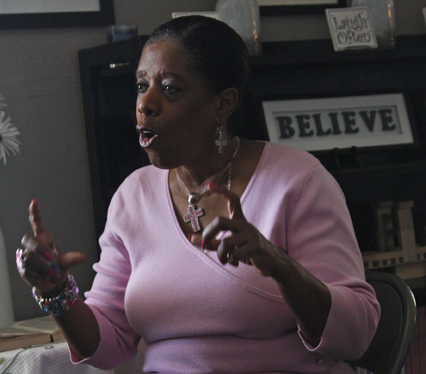Story By Brittany Hardy
Photos By Sarah Groman
Shirley Langston, owner of Restoration Haven, is passionate about seeing lives change. Determined and business-like as she relays the details of the organization, tears fall from her dark eyes as she transitions into describing what makes her demanding job worth it.
“I’m actually seeing people’s lives that were entrenched in hopelessness, who thought there was no way out, who are saying ‘I’m going to school now,’ ‘I bought a car,’ ‘I found a job,’” Langston said. “There are people who have been stuck for years and are becoming unstuck. They may not be all the way there, but just to see people moving and having hope again. Seeing children brag about their parents who’ve gotten a job or who have gone back to school. They’re breaking the cycle of poverty.”
Six years ago, Langston’s grandmother, who had faithfully raised her, was ill, and the corporate world’s well of luxury and affluence had run dry, leaving Shirley empty and unsatisfied. She left the commercial domain of Dallas to discover that her former home in East Waco was drastically different from the haven of safety and community it had been during her childhood.
Between 1990 and 2000, the East Riverside neighborhood of Waco lost 171 people. Then, it is estimated that another 144 people left the neighborhood from 2000 to 2005. Between 2005 and 2009, 11 acres of formerly developed property became vacant.
Soon, Langston realized it was up to her to bring restoration and education to her formerly adored expanse. After working with Mission Waco and serving as a volunteer for AmeriCorps, Langston – with all her characteristic spunk and determination – broke out on her own to work specifically with East Waco.
Now, entering the comfortably decorated Restoration Haven refurbished apartment, one almost immediately comes face to face with a giant black bridge painted across the wall. For Langston, this is the perfect representation of what her organization is all about.
Ezekiel 22:30 is also relevant to what Langston has created and is a verse found on the Restoration Haven website: “I looked for a man among them who would build up the wall and stand before me in the gap on behalf of the land so I would not have to destroy it, but I found none.”
Restoration Haven is committed to bridging the gap between the rich and the poor – between the people of the East Waco community and the resources and education they need. The group also seeks to inform outside organizations of the unmet needs and distinguished potential within the neighborhood – and in a city with a 27 percent poverty rate, this mission is both necessary and ambitious.
Langston is the community’s stable, solid backbone. Like a foundation, she attaches the upper body of the outside community – its schools and businesses – to the lower body, a community wrecked and ravaged by poverty.
“Our main goal and focus is to empower the people in this community through parenting classes, budget class, nutrition, Bible studies – anything that would affect the quality of life for a person,” Langston said. “We are also advocates. We do a lot of advocating for these residents.”
Restoration Haven fights for improved education, acts as an intercessor in juvenile and child support courts, provides bus passes and works in doctors’ offices and with hospital relations.
Ninety-five percent of the families receiving aid from Restoration Haven are composed of a single mom and several children. Among the many other resources extended through Restoration Haven, these families may attend individual, group and family counseling sessions.
In this type of family structure, the mom often works, while the children spend most of their time alone. A child alone eats cookies and chips, whatever is on the counter, violating the rules of good nutrition, as many basic needs are left unmet.
While these physical needs are important, the emotional stability of the children may be of even greater concern. In single-mother households, there is often no one there to affirm the sons’ masculinity or to show a daughter how she deserves to be treated.
Langston tries to serve as this stability. She is clothed in strength: the muscles of the missing fathers, the tight fibers of the other otherwise-lacking resources and the strings of ministry she weaves in her Bible studies and life skills classes.
One specific example of a program connected to Restoration Haven is the GAP program, which stands for God’s Abundant Provision. As a result of this program, individuals in the community may come in once a month to receive basic resources. Upon arrival, each individual is checked for how well he or she is sustaining his or her life – expressed through growth in work and school. If he or she is not working in either of these outlets, he or she must attend life skills classes. In return, they receive supplies such as toiletries, food and clothing.
Langston blames integration for the drastic changes in her East Waco community since her childhood.
“We were a really good community, thriving, business, good students and schools, when integration hit they bused all the kids in this community to Richfield,” Langston said. “With that came the loss of jobs and thus professionals leaving to seek employment and housing elsewhere, just leaving the working poor with no tax revenue coming in. At one time all the teachers, doctors and such lived in this community. I was proud as a little girl knowing my teacher, my doctor – they all lived in my community. It’s not like that anymore.”
Langston found herself unsatisfied with her corporate career. Now, she is a woman of grace and love – gentleness mixed with unmatched determination – divinely entrenched with the beating heart of this growing community.
The weight of their problems falls on Langston, but she remains upright.
Instances of hope include Langston receiving contributions from her clients.
“It may be $5, but I know the sacrifice they made to give me that $5,” Langston said. “The first of the year is really hard sometimes. We were really low on GAP supplies and they would come in and give what they have. One of my clients gave about three bags of stuff that she bought and some money and I just bawled.”
Langston has found joy in the selfless hearts of the community children. When much of Haiti was destroyed by earthquakes in January, many of the children approached her to find out if there were ways they could help.
“They wanted to give to Haiti. These are kids who have a need themselves but want to help others. Some of these kids don’t have food or a toothbrush but they want to make sure the kids in Haiti can brush their teeth and take a bath,” Langston said. “And sometimes I wonder if that’s because they know what it means to have a need.”
Christ is the foundation of the work Langston has done in the community. It is especially important to her that the members of the community are educated about their worth through the renewing word of God. This concept is so vital to Langston’s life and mission that she hopes to publish a book about finding one’s identity in Christ alone.
“[The people of this community] have to be able to identify themselves through their creator. They need to know that everyone has a destiny and a purpose,” Langston said. “It’s not based on where you live or what you have; it’s based on using the gifts He’s given you to accomplish something in life.”
It is through organizations like this one that lives are changed. Working, single mothers gain education and employment. Children become empowered. Negative perceptions are broken and tossed aside. This is how restoration occurs.
“There’s such a perception. They want people to stop believing they’re lazy,” Langston said, “Sometime situations can cause you to fall into poverty. Many women are afraid their children will struggle with that stigma. We want to break off the perception that people are lazy. While we do have people like that, we also have people who are working really hard – the working poor. You make minimum wage and you have three or four children. That’s really hard.”
Langston has spent the last six years trying to understand what will break the cycle of poverty her neighbors are experiencing. For her, and for Restoration Haven as a whole, education is an indispensable entity of what they do.
“I feel like education is the key, on both sides of the spectrum,” Langston said. “When we educate people who live in poverty and educate those outside the neighborhood on what it is like to live in poverty, they’ll have a whole new perspective. And we educate the poor to have hope. They have two choices: they need to be working or going to school. It is the only way, I believe, they will ever make it out of poverty.”



